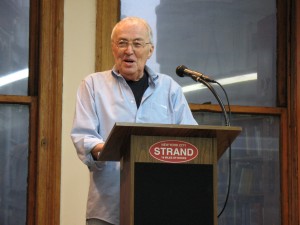It still bothers me greatly that David Foster Wallace fabricated huge sections of his so-called non-fiction pieces. I don’t think his great talent made that okay. But it’s difficult to discuss such things sensitively considering the unhappiness of his life and the sadness of his death.
I just came across a 1999 article Wallace wrote for Salon about the five most unappreciated American novels since 1960. I’ve read the titles on his list, so I thought I would give my take on them.
•Omensetter’s Luck (William H. Gass, 1966): I’ve never really connected to Gass’ work, even his short fiction, but this one, his first novel, is his best. That said, I didn’t really enjoy this Faulkner-esque story, which concerns a preacher obsessed with the good fortune of a seemingly undeserving man, until the final third. What’s amusing is that my edition contains an essay by the author about how his OL manuscript was stolen by a colleague. It’s straightforward, filled with rich metaphor and emotion. After reading it, I though that perhaps Gass has been trying his whole career to write with someone else’s strengths instead of his own.
•Steps (Jerzy Kosinski, 1968): Not so much a novel as a collection of nightmarish stories linked by theme and tone. Like Kafka, but with the lurid eroticism and violence above the surface. Kosinski’s sexual politics could be gross, but this is a very brisk read and some of the stories will remain lodged in your brain, unforgettable for their paranoia and horror.
•Angels (Denis Johnson, 1983): Bruising, heartbreaking novel about a single mom toting her at-risk family through the underbelly of America. It does not have the lightness of tone that Jesus’ Son has. Not at all. But it’s the second-best fiction Johnson has written after JS.
•Blood Meridian: Or the Evening Redness in the West (Cormac McCarthy, 1985): This insane, brilliant and unsentimental novel set in the Old West is one of my absolute favorites. A story about innocence devoured in the belly of the beast, it’s the book that Herman Melville tried and failed to create in Moby Dick.
•Wittgenstein’s Mistress (David Markson, 1988): The best of the author’s typically avant-garde anti-novels, it follows the (repetitive) thought process of a woman who may be the last person on Earth. Philosophical and challenging, you will love it or quickly put it down.•


